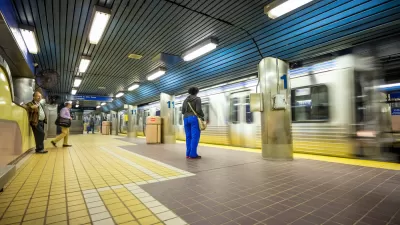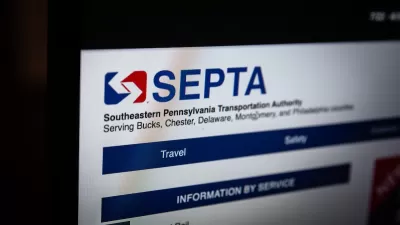With Pennsylvania a battleground state and Philadelphia a Democratic stronghold, ensuring that transit-dependent voters get to the polls was a given, but a transit strike beginning Nov. 1 threatened to derail access. The strike was settled Monday.

"A strike that paralyzed public transportation in Philadelphia for a week ended Monday when the Southeastern Pennsylvania Transportation Authority (SEPTA) and a union representing almost 5,000 employees announced a deal on the eve of Election Day," reports John Bacon with USA TODAY.
The deal was struck hours after the transit agency announced it was seeking a court injunction to force its employees back to work. SEPTA said any disruption of public transit would inhibit city residents from voting in Tuesday's elections.
A SEPTA press release states that phased service was implemented on Monday, with "full service to be restored by start of service on Tuesday." It indicates that SEPTA and TWU Local 234 agreed to "a tentative five-year contract."
The tentative contract agreement will now go before TWU Local 234 members for a ratification vote, and to the SEPTA Board for approval.
Bacon adds, "Any issue that might disrupt voter turnout Tuesday would be problematic for Mayor Jim Kenney and other Democratic leaders of this overwhelmingly Democratic city that is expected to provide big numbers for Hillary Clinton's presidential bid.
SEPTA's bus, subway, and trolley services provide about 900,000 rides on weekdays. The Regional Rail services did not strike, but they were reportedly overwhelmed with riders displaced by the transit strike.
In addition to the mayor's press release on the resolution of the transit strike, he also issued two transportation-related press releases on Nov. 7 that will make it safer for those who bike or walk to polling places on future election days.
- He signed "an Executive Order that formally creates the Office of Complete Streets and a Vision Zero Task Force, a major step toward the goal of making Philadelphia streets safer for all users.
- He recognized the indispensable role that "Indego, Philadelphia’s public bike share transportation system, played in keeping Philadelphia moving during the SEPTA service interruption this past week."
-
Indego daily ridership doubled during that period, with a total of more than 24,000 trips. Ridership averaged more than 3600 trips, with a peak of 4300 trips last Friday. This marked an increase over the average weekday ridership of 2,400 trips per day since our spring expansion.
Related on Planetizen:
- Could the Philadelphia Transit Strike Determine Who Becomes the Next President?, November 3, 2016
- Indego Bikeshare in Philadelphia Building on Early Success, August 10, 2015
FULL STORY: An early win for Clinton: Transit strike ends in Philly

Study: Maui’s Plan to Convert Vacation Rentals to Long-Term Housing Could Cause Nearly $1 Billion Economic Loss
The plan would reduce visitor accommodation by 25,% resulting in 1,900 jobs lost.

North Texas Transit Leaders Tout Benefits of TOD for Growing Region
At a summit focused on transit-oriented development, policymakers discussed how North Texas’ expanded light rail system can serve as a tool for economic growth.

Why Should We Subsidize Public Transportation?
Many public transit agencies face financial stress due to rising costs, declining fare revenue, and declining subsidies. Transit advocates must provide a strong business case for increasing public transit funding.

How to Make US Trains Faster
Changes to boarding platforms and a switch to electric trains could improve U.S. passenger rail service without the added cost of high-speed rail.

Columbia’s Revitalized ‘Loop’ Is a Hub for Local Entrepreneurs
A focus on small businesses is helping a commercial corridor in Columbia, Missouri thrive.

Invasive Insect Threatens Minnesota’s Ash Forests
The Emerald Ash Borer is a rapidly spreading invasive pest threatening Minnesota’s ash trees, and homeowners are encouraged to plant diverse replacement species, avoid moving ash firewood, and monitor for signs of infestation.
Urban Design for Planners 1: Software Tools
This six-course series explores essential urban design concepts using open source software and equips planners with the tools they need to participate fully in the urban design process.
Planning for Universal Design
Learn the tools for implementing Universal Design in planning regulations.
Ascent Environmental
Borough of Carlisle
Institute for Housing and Urban Development Studies (IHS)
City of Grandview
Harvard GSD Executive Education
Toledo-Lucas County Plan Commissions
Salt Lake City
NYU Wagner Graduate School of Public Service




























